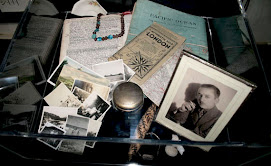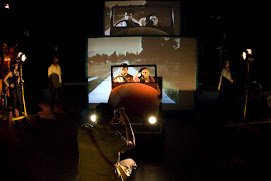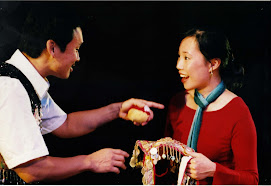14 November 2010
Shorts & long-term thinking
I’ve also been thinking a lot about what I want to write over coming while—the next few years, at least. It kicked off with a decision not to do any more 10-minute pieces (7-ON gigs excepted). I’ve written quite a few of these, some went OK, some not so OK, and I’m not saying that I’ll never ever write another one ... But here’s my reasoning: while the 10-minuter has its uses and particular pleasures, for me they stopped being ‘opportunities’ and become distractions from the main game. I wasn’t grappling with big ideas and deep creative and intellectual ambition, I was fiddling about on the fringe, in order to feel that I was still on the list of working playwrights.
I emailed these thoughts to 7-ON and we had some great debates—about the pluses and minuses of the short form, about the proliferation of shows, seasons and festivals of short plays. What this explosion reveals about current theatre ecology; how this snapshot form reflects and engages with our digital world (or not); why we’re seeing the names of more and more established and well-established playwrights in program line-ups (interestingly, a trend not replicated by directors), and what that means for new and emerging dramatists trying to catch a break ...
As working writers we constantly reassess and rethink, try different tacks and ways of getting our work into the world. Explore different processes, genres and even artforms. Post Songket in 2003, I set myself the task of writing quickly: 5 weeks to go from concept to a draft solid enough to send out. I also vowed to redraft only when a company and collaborators made a definite commitment to production. I wrote 3 scripts this way. (Redheads, Mrs Petrov’s Shoe and The Stepping Stars of Bóronkowice, which began as a stage play and ended up on radio.) The cloudburst got 3 works into production … and generated another phase of reflection, this time culminating in a decision not to write any more plays ‘on spec’. And although I still have a couple of unproduced ‘spec’ scripts (written before that decision) that I’d like to see get up, my (live) performance writing has since been confined to the occasional commission, and to monologues or ‘performance essays’ that I've presented, or can present, myself.
I’ve always liked my theatre to be either exuberantly, audaciously theatrical (e.g. Caryl Churchill, the work of English company 1927), or the complete opposite, bare and basic (e.g. the work of American Mike Daisey). I recently saw 1927’s new work, The Animals & Children Took to the Streets, and loved it even more than their previous show, Between the Devil and the Deep Blue Sea. To write for theatre like that would be inspiring, but too much of the theatre on offer falls into a gravelly middle ground that doesn’t particularly interest me.
And so to our infatuation with actors. I suppose it’s part of the whole celebrity obsession thing, but this weekend it got to me. Before I continue, I should say that some very good friends of mine are actors, and this little rant isn’t about actors per se. It’s about attitudes towards them. Why do we mystify their craft, sometimes to the point of infantalisation? Why do a select few earn a motza, while the vast majority work for lousy wages in lousy conditions?
Anyway. In one or other of this weekend’s newspapers (The Sydney Morning Herald and The Weekend Australian) there was a profile of Sydney Theatre Company co-AD Andrew Upton in which he rhapsodised at length about how marvellous actors are. A television reviewer in another article raved about a bunch of actors and suggested that we just let them lose and record whatever they say or do. (I assume—I hope—she’s joking and does realise that actors usually speak lines written by writers and directed by directors.) Elsewhere Griffin AD Sam Strong, when asked who had it tougher, playwrights or poets, replied poets. Because playwrights get to hang out with actors. Why is hanging out with actors better than hanging out with other writers? Or with painters or horticulturalists for that matter? And this reminded me of the previous weekend’s preview/publicity article for a TV series which, if you didn’t know better, would have you believe it was all the work of one extraordinary star actor. (BTW, I’m not blaming individual actors for these misrepresentations, but the machinery, PR and otherwise, that elevates actor to hero.)
Critics, I’ve noticed, like to cosy it up with actors. They’re often way more comfortable talking about performances than they are about such elements as design, music or direction. A production is solely the performances of the actors—that’s what they often imply. Even in film, where so much of a performance is constructed by the camera, or after the event, by editing. Yes, I accept that camera and editing can’t make a crap performance soar, but they can—and do—make uneven performances good enough to win awards. In theatre of course, actors are more exposed and do carry more of the show. Perhaps for this reason, reviewers are generous towards them, in a way they rarely are to writers and directors. Have you ever read a review that said: This was a fabulous play/text, complex and nuanced, but these actors were simply not up to the task? I haven’t. Perhaps critics dwell on actors and their performances because they find character an easier topic to riff on than say, visual style or structure or registers of language?
Back to writing. I plan to finish the monologue that was called Bounce and is now Good With Maps, early December. It explores some quite difficult, and personally confronting material, so it’s taking longer than I’d planned. After that I’ve set aside a few ‘technology days’ to update and switch over various things. (After a computer crash/scare, I’ve decided that clouds are a must for writers, and I now have my files backed up in Dropbox.)
While I was in England, I learnt that a one-act play I wrote for children called The River That Ran Out, was Highly Commended in the Trinity Guildhall International Playwriting Competition (for audiences of 11-years-old and under). That news was particularly sweet because a few minutes earlier I’d discovered that my ATM card had been scammed in London, and my bank account cleaned out! Back home in Sydney The Story of this Moment was one of 6 scripts short-listed for the inaugural 2010 Richard Burton Award for New Plays. It’s a very out there, unconventional music-theatre script, so a surprising inclusion. But very welcome.
Also in December, I begin with the thistles, my big non-fiction project, and I am so looking forward to it. To immersing myself, getting lost in a really big project ...
26 July 2010
Unrequited in Melbourne
I’m presenting my monologue Unrequited in Melbourne as part of Asialink’s Winter Writing Series. It’s part of their Anti-travel-writing event along with 3 other writers: Linda Neil, Petrus Spronk & Andrew Sant.
Korea captured my imagination in 1993 and has held it ever since. I've tried on several occasions to escape into other countries in the region, but it's Korea—South, North, and the diaspora—which figures most prominently and most often in my writing. From a car crash in Pyongyang on an afternoon so cold the wind blew the words back down my throat, to an encounter with Chekhov in a Busan bar, Unrequited attempts to understand this rather one-sided love affair.
It’s a free event and apparently includes ‘winter-warming refreshments’. Interested? RSVP/register online here.
08 June 2010
Review
27 May 2010
Salt Lemon

16 April 2010
All lit and no play
Lot of heat in the blogosphere about the NSW Premier’s Literary Awards judges’ decision that no plays this year are worthy of nomination. Currency Press have issued a media release (which seems to have disappeared from their website, but you can read it here on James Waites' blog), but I think the best discussion is—perhaps not surprisingly—at Theatre Notes. Let’s use the NSW judges’ omission to have a real discussion about performance writing—what it is, and what it might be.
I’ve left a few comments around the traps, including on the Australian Literary Review blog. Unfortunately the responses there (those that aren’t in-crowd chit-chat about the event where the short-list was announced) dump on Australian performance writing. Sigh.
BTW I didn’t enter a play, so have no personal axe to grind.
11 April 2010
The most exciting book I've read in ages
Here’s one of my favourite sections:
‘For me, anyway, the fictional construct rarely takes you deeper into the material that you want to explore. Instead, it takes you deeper into the fictional construct, into the technology of narrative, of plot, of place, of scene, of characters. In most novels I read, the narrative completely overwhelms whatever it was the writer supposedly set out to explore in the first place.’
Not only novels. How many plays have I seen where exactly that has happened? Where an interesting idea or sensibility has been squashed flat under a ton of plot points, character arcs and narrative crapola.
Reality Hunger is one of the most exciting books I’ve come across since I read Therapy’s Delusions (years ago) and Ethan Watters’s and Richard Ofshe’s contentious argument that Freud’s notion of an active unconscious that affects our everyday lives is nothing more than a culturally supported myth. But that’s another story.
08 April 2010
Unperformance
Screens and projections have become commonplace in theatre. Sometimes the footage is well shot and/or designed, sometimes not. Sometimes they’re imaginatively and deftly used, sometimes not. Sometimes they add, sometimes they diminish.
Combining recorded images and on-stage action is a complex and intricate business. As is fusing deferred and live performance. I’ve seen productions with lavish and costly projections that have been pretty ho-hum, and incredibly simple set-ups that worked brilliantly. Success is obviously down to more than technology and resources (although they help).
You’re probably sensing a ‘but’ here …
Screens, both individual and public, are a feature of contemporary life. As theatre-makers of course we want to reference and make use of them. But this ubiquity also prompts reservations. When many of us spend so much of our time gazing at screens on computers, iPhones, tablets, TVs, etc. do we—do I—want to go to the theatre for more of the same?
I have mixed feelings about this, and certainly nothing per se against the use of screens on stage … but there is something unique and compelling about the live, unmediated exchange. I love the directness of stand-up, of spoken word and poetry. Of readings. Of the guided tours you bump into. Of the everyday, happenstance performances you come across in supermarkets and department stores (such as cooking demonstrations) and in malls (spruikers and the like). Although perhaps my preference for these bare-bones, solo forms reflects nothing so much as my current disenchantment with theatre, much of which I’m finding limited, over-reliant on a handful of easy, predictable tropes, even—dare I say it?—intellectually banal.
But let’s end on a more up-beat note. One of the most stunning theatrical combinations of live performance and projections I’ve seen was Between the Devil and the Deep Blue Sea from UK company 1927. Catch them on YouTube.
And the good news is: they’re returning to Sydney with a new show later this year.
18 February 2010
Moving on ...

10 February 2010
Stories from the 428

It’s the brainchild of the dynamic Gus Supple, and this is what she has to say about it:
Thousands of people everyday travel on the buses and trains of Sydney—to work, to school, to meet friends or family. Though a necessary part of life in the city, public transport is an unknowing catalyst to creation. Many of us use our train or bus rides to message friends, read a book, write a card, read a newspaper, make notes in a diary. And the buses become a form of mobile office, taking us from A to B while we make plans or take notes.
Harnessing the talents of some of Sydney’s most dynamic writers, Stories from the 428 finds the sublime and extraordinary in the everyday bus ride and transports it on stage.
Inspired by conversations, scenes from the bus window, overseen text messages or perhaps the person sitting across from them, a group of 8 playwrights per week will collaborate to create a unique and surprising theatrical experience centred around the 428 bus route.
I was drawn to this for a number of reasons, but 2 in particular. I’m a passionate advocate for public transport, (I haven’t had a car for years) and in the late 1990s I lived in Dulwich Hill and travelled frequently on the 428 bus. My second main reason for joining Stories from the 428 was that it was all going to happen fast, fast, fast. We’d catch the bus, write our scripts, rehearse, and put them on over the course of a couple of months. When the gap between starting to write a play and opening night can stretch for years, this appealed to me. By way of contrast, I began Songket early 1997 and by the time it finally went on mid 2003, I had to work hard to rekindle my interest. To paraphrase the announcers on the London Underground: Mind that gap!
Stories from the 428
Week One: Wednesday 24—Saturday 27 March at 8:00 pm & Sunday 28 March at 5:00 pm.
Week Two: Wednesday 31 March--Saturday 3 April at 8:00 pm & Sunday 4 April at 5:00 pm.
Sidetrack Theatre, 142 Addison Road, Marrickville. (The 428 bus stops just outside.)
In the meantime, check out the project’s website: http://www.storiesfromthe428.com/ and Facebook page.
25 January 2010
Absolutely no sofas
To me, sofas on stage are the theatrical equivalent of bookshelves in documentary films—the expert interviewed in front of his packed bookcase. This is not because I’ve got anything against domestic or office décor per se, (I love books and have crowded shelves of my own) it’s because a sofa represents a certain kind of play and production.
At various points I’ve tried to write these more traditional narrative dramas with plots and character journeys and naturalistically-inclined dialogue. The kinds of plays that get programmed in subscription seasons. What usually happens though, is I get to about page 5 and complete anarchy has broken out—I want to introduce a robot or a flock of singing sheep, or I find that one of my sensible characters has flipped his arc to riff on the difference between moths and butterflies, which, BTW, is not night and day. From time to time, generally when I’m looking at a 2-digit bank balance, I’ve berated myself for not trying harder to write this kind of play. But not any more. This is the year I finally admit that I don’t much like conventional narrative drama, and I don’t want to write the stuff. It’s not my shtick. So my motto for 2010 is: embrace your inner maverick.
Speaking of which, I saw Tim Key’s show The Slutcracker on Saturday. A wonderful and wonderfully idiosyncratic mish-mash of poetry, performance, film, philosophical nuggets and improv. It’s daggy and meandering and clever and funny, and best of all, utterly unpredictable. Unlike the STC’s Tot Mom. After 5 minutes, I knew where that was going. The critics loved it, as did a number of friends and colleagues. What can I say? It had a lot of chairs of the hard, un-upholstered variety, but at least it had no sofas.
23 January 2010
Research fever

My desk is a Manhattan skyline of books about weeds. Texts recent and old, scientific pamphlets, surveys, fieldguides, fictional weeds, Australian weeds, foreign weeds, even sci-fi weeds. The floor is awash with printouts and pages of notes, my computer loaded with databases and login codes for various libraries.
A bit of backstory: Weeds are a long-standing interest of mine, and I’m researching them now for 2 projects. One is a personal essay/non-fiction piece for radio called Weeds Etc. The other is one of the 2 projects for which I’ve got a New Work grant from the Australia Council Literature Board: an unconventional memoir in 11 parts.

The difficulty—my difficult—is that everything I read suggests several more things to seek out and read, suggests other avenues of inquiry, spreads into new areas of imagining. And it’s all fascinating and absorbing and I just want to keep on finding out more …
So how much is enough? How do you know when to stop with the research and start with the writing? Begin drafting that first rough version of the script or chapter or poem? How do you decide what is necessary, and what is overkill? Can research become a way of avoiding the harder task of actually writing? Something like:
Research = relatively easy + comfortable
Writing = difficult ∴ put off for as long as possible
Although of course, the equation isn’t that simple. Because research is not only about digging for information, it’s also about thinking, about ideas marinating, about living with the material and its myriad possibilities. It’s about letting your sensibility permeate your findings, it’s about sticking one thing to another, and about the deep pleasure of discovery.
Nevertheless, I shall have to draw the line at some point and move into the writing phase. (Which may require further research because the 2 phases do not exist each in their neat separateness, but are parts of the one, somewhat elastic process that is writing ...) To that end I will stop this post here. (Is blogging another way to avoid writing the script or poem or essay in hand?) And return to the strange and captivating world of weeds.

+Photo+Leah+McGirr+3.jpg)



